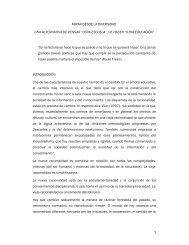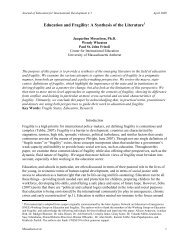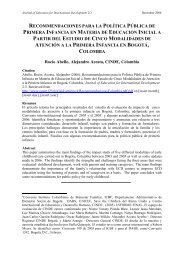The Power of Persistence: Education System ... - EQUIP123.net
The Power of Persistence: Education System ... - EQUIP123.net
The Power of Persistence: Education System ... - EQUIP123.net
You also want an ePaper? Increase the reach of your titles
YUMPU automatically turns print PDFs into web optimized ePapers that Google loves.
Country commitment to improving policies, governances and institutions.<br />
• Sound policies and committed leadership at the country level, supported by<br />
appropriate expenditure frameworks and effective budget execution.<br />
• Community and country ownership is essential.<br />
Adequate operational capacity to implement at all levels.<br />
• Capacity <strong>of</strong> communities to participate effectively, and the right incentives,<br />
so that countries can translate sound policies and strong leadership into<br />
effective action.<br />
• External support for change and capacity building.<br />
Financial resources adequate to scale up programs that work.<br />
• Cost structure M&E, hiring <strong>of</strong> staff, avoid high staff turnover Government<br />
needs to see advantage in scaling up.<br />
• Many programs have yet to become comprehensive in either geographical<br />
coverage or context.<br />
• Scaling up should depend on empirical evidence that the program works.<br />
A strong focus on results- accountability for learning and outcomes- so that<br />
policies and programs are built on empirical evidence <strong>of</strong> problems and solutions<br />
that work.<br />
—Summarized from Development Effectiveness and Scaling Up: Lessons from Case Studies, World Bank Board Report (2002).<br />
<strong>The</strong> issues <strong>of</strong> effectiveness, sustainability, capacity, scaling up, and ownership<br />
discussed above are all illustrations <strong>of</strong> a complex system, in which different<br />
aspects are mutually dependent and interrelated. Change can only take root<br />
when all aspects <strong>of</strong> the system support technical and pedagogical innovations.<br />
This implies that effective engagement in education reform requires more than<br />
a series <strong>of</strong> activities, but rather a coordinated systems approach. <strong>The</strong> following<br />
section discusses an approach to dealing with education as a system.<br />
A SySTEMS APPROACh TO EDUCATION REFORM: WhAT<br />
CONSTITUTES MEANINgFUL ChANgE IN EDUCATION SySTEMS<br />
Evaluations <strong>of</strong> aid to education usually focus on project activities, outcomes,<br />
and, to a lesser extent, impact. However, there is a growing recognition that the<br />
“process <strong>of</strong> change is as important as the immediate or quantifiable results <strong>of</strong><br />
the change” (Sam<strong>of</strong>f, 2001). In a background paper to the Joint Evaluation <strong>of</strong><br />
Aid to Basic <strong>Education</strong>, Dr. Joel Sam<strong>of</strong>f noted that some <strong>of</strong> the most important<br />
contributions to effective change were not the immediate outcomes, but in<br />
programs that “emphasize relationships rather than distinctions, reciprocal<br />
interactions rather than causality, and shorter-term proximate consequences<br />
rather than longer term impacts”. From this perspective, meaningful change<br />
SECTION 1: INTROdUCTION<br />
27

















